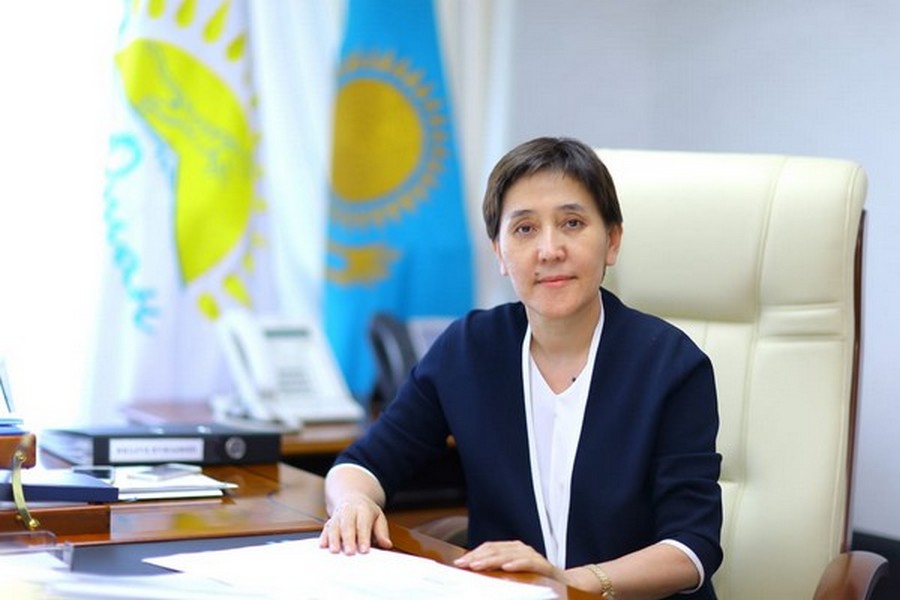President of the JSC Center for the Development of Labor Resources Tamara DUYSENOVA:
THE UNEMPLOYMENT RATE IN KAZAKHSTAN COULD GROW UP TO 13.7% UNLESS URGENT MEASURES ARE TAKEN

After the COVID-19 pandemic, not only people, but also the economy will recover. Billions of people around the world are left jobless, not all enterprises will be able to recover after a long shutdown. Advisor to the President of Kazakhstan and President of the Center for the Development of Labor Resources Tamara DUYSENOVA talked in an interview with Interfax-Kazakhstan what Kazakhstan faces and what measures are needed in order to minimize consequences.
- Tamara Kasymovna, what are your forecasts for the development of labor in Kazakhstan after the pandemic? Obviously, so many enterprises, especially small and medium-sized businesses, will not be able to return to work, and a crowd of unemployed [people] will flood the market.
- Yes, unfortunately, this is quite likely. This is already happening in the world. According to the International Labor Organization, 1.25 billion employees, or 38% of global workforce, are employed in sectors that are currently facing serious production cuts and a high risk of workforce migration. Already, the coronavirus crisis has affected 3.3 billion working people worldwide.
In Kazakhstan, according to forecasts, the crisis will affect at least a third of the entire workforce and, in the frist instance, 3.3 million people employed by small businesses. According to preliminary estimates, in the short term, 1.3 million people are expected to be redundant, temporarily laid off and lose income in an optimistic scenario, 1.9 million in a moderate scenario and 2.5 million in a pessimistic scenario.
Unless urgent measures are taken to prevent mass unemployment and promote employment, the unemployment rate may rise from 4.8% to 13.7% - just in the optimistic scenario.
In any case, this will lead to serious economic difficulties. Therefore, it is now very important to take additional anti-crisis measures aimed at supporting business, saving jobs and, accordingly, household income.
- The Kazakh government has already taken a number of measures aimed at overcoming the crisis. Do you consider that this is not enough?
- The measures taken are timely and, undoubtedly, constructive. However, the ongoing pandemic and forced lockdown measures exacerbate the situation and compel us to adjust all our plans.
Already today 156,000 small business enterprises have felt negative consequences. This is 67% of their total number. Social payments from the State Social Insurance Fund [42,500 tenge, paid to citizens who have lost income due to the introduction of the state of emergency] have already directed at more than 4 million people (of them more than 60% are people employed by small businesses), and applications for assistance keep coming.
According to our estimates, in the moderate scenario, the largest lay-offs or temporary job suspension will affect: accommodation and catering services (70.2%), leisure and entertainment (68.3%), other individual services (64%), trade (35%) , transportation and warehousing (38.5%), construction (35%). Therefore, in the very near future it is necessary to take robust measures to support redundant staff and their return to work , otherwise it will lead to an increase in black employment and unemployment.
Given the experience gained and measures taken in the OECD countries to overcome the crisis, we propose to implement a number of projects.
In the first instance , it is necessary to introduce payroll subsidies for staff of small and possibly with the inclusion of medium-sized businesses , while keeping up or creating new jobs. For companies operating in sectors such as retail trade, social and utility services, assistance will be required within 3 months of the end of the emergency regime, since they will be able to quickly restore their business. Industries such as tourism, entertainment industry, international haulage will take much more time to recover, and accordingly, they will need assistance for a longer period - 6-12 months after the end of the emergency regime.
The subsidy amount per employee should be set by the government. I believe that it cannot be less than the minimum wage that is paid currently from the State Social Insurance Fund.
Pre-empting the question, let me clarify, perhaps this is not so much, but the state of the country’s economy must be taken into consideration. The state can always [do] only what it can. It should not be forgotten that this is an addition to the employer’s pay , which is equally beneficial to both the employer and the employee.
And in order to avoid mala fide cases the registration of work contracts through the e-labor exchange will be a must for the allocation of subsidies to the employer. Such registration does not harm a bona fide entrepreneur, and in case of dishonesty, registration of contracts will become a guarantee for employees.
In addition, it is proposed to take a decision on state subsididies for mandatory pension contributions for staff with low wages by the end of 2020 in order to stabilize citizens' incomes and expand domestic demand. For that , it is necessary to outline the sectors of the economy and the list of activities where subsidies will be applied to pension contributions.
It is also proposed to consider the possibility of providing payroll subsidies for the self-employed within 3 months of the lifting of the state of emergency, provided that they are registered as self-employed and individual entrepreneurs on the e-labor exchange.
Grants (530,000 tenge established under the employment program) for crop cultivation and livestock farming may be another type of assistance especially for villagers. This will provide employment for citizens, on the one hand, and families with their own produce, on the other hand.
It is also necessary to consider the possibility of subsidizing payroll for people involved in public work, employed in social workplaces and [involved with] youth practice [activity], regardless of whether they are set up in public or private sector entities.
- Will these measures be sufficient?
- Of course, the state cannot and should not subsidize staff wages in the private sector indefinitely. But there are other fairly market-based measures of assistance.
For example, conducting targeted purchases of goods, work and services from domestic SMEs by central and local authorities. At the same time, when choosing a supplier, it is possible to provide a conditional discount of 10% of the cost of goods, work and services offered by SMEs.
One can also consider the possibility of providing soft loans to SMEs for the production of goods, work and services.
Another measure is the provision of state guarantees for the banks on loans to SMEs.
It’s possible to use an introduced universal payment card - an ID card - to stimulate domestic companies’ demand. This work has already begun, and throughout 2020-2021 it is planned to put about 4 million people- recipients of state social welfare payments and benefits - onto such a settlement basis.
How do these cards help business? It may be beneficial for business to increase the demand by establishing discounts on goods paid with ID cards, say, 10%. Such a mechanism, by the way, will also make it possible to monitor the return of allocated funds to the economy.
- These measures are aimed at supporting the existing businesses and businesses that “survive” lockdown. But there are those as well, who have already ceased activity, been forced to cut the staff. What about them?
- Unfortunately, these processes are also taking place, you are right.
The implementation of projects is envisaged with creation of temporary jobs (infrastructure, landscaping projects, etc) in order to accomplish the task of employing people being redudant or sent on unpaid leave. The important term is the size of pay in such workplaces should be no less than 2 minimum wages whereas employers are obliged to register work contracts on the e-labor exchange of the Ministry of Labor.
It is also necessary to review the mechanism for issuing microloans by expanding the categories of recipients. These, for example, are people, who are starting their own business for the first time, as well as owners of small business enterprises working in the market for no more than one year and implementing startup projects. Hereto it is proposed to establish a microloan amount of up to 3 million tenge for rural communities, 5 million tenge for urban areas, provided that [recipients] completed training and defended their business plan.
I want to emphasize that these measures should not be just an empty investment of public money in private companies. On the contrary, the entire package of proposals is designed to ensure that every tenge invested by the state will return being multiplied into the economy thanks to production maintenance and further production expansion and our citizens’ income preservation.
- Thanks for the interview!
May, 2020
© 2026 Interfax-Kazakhstan news agency
Copying and use of these materials without reference to the source is prohibited
Archive





